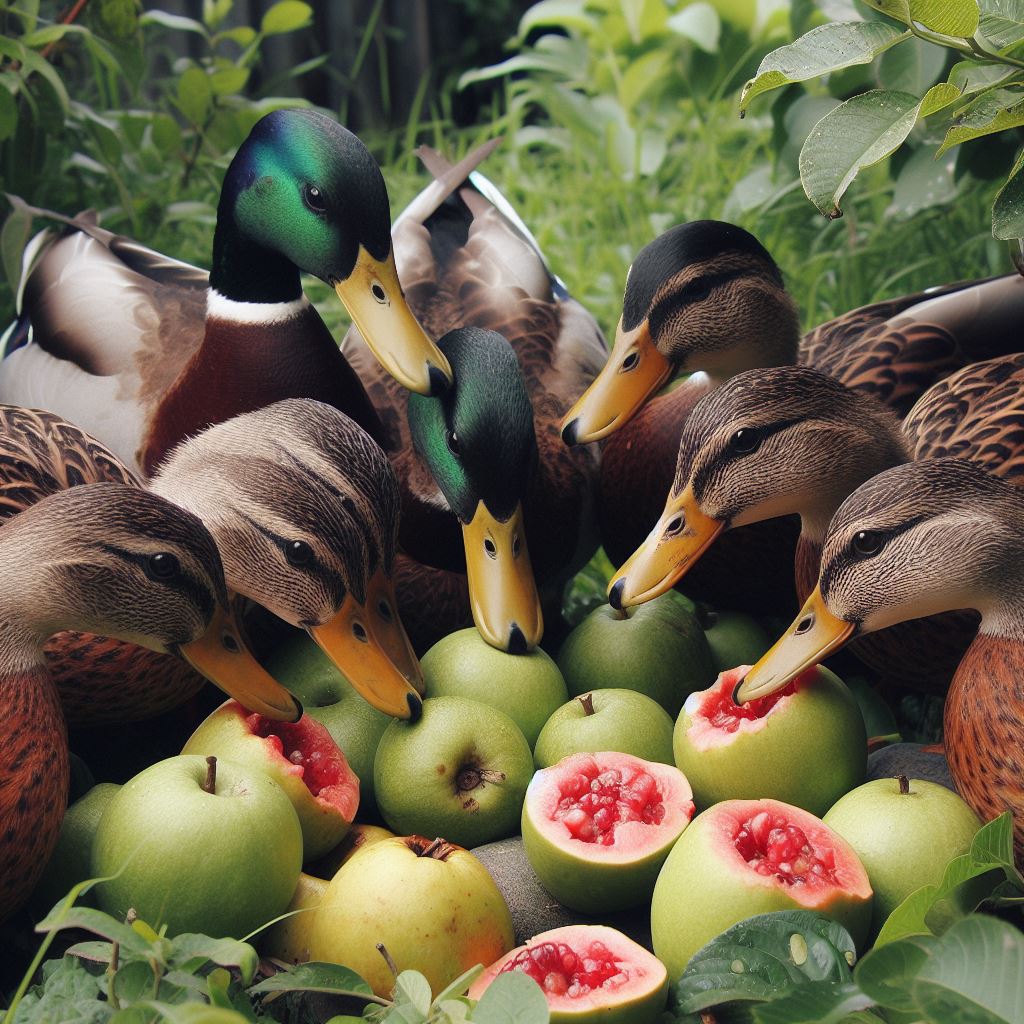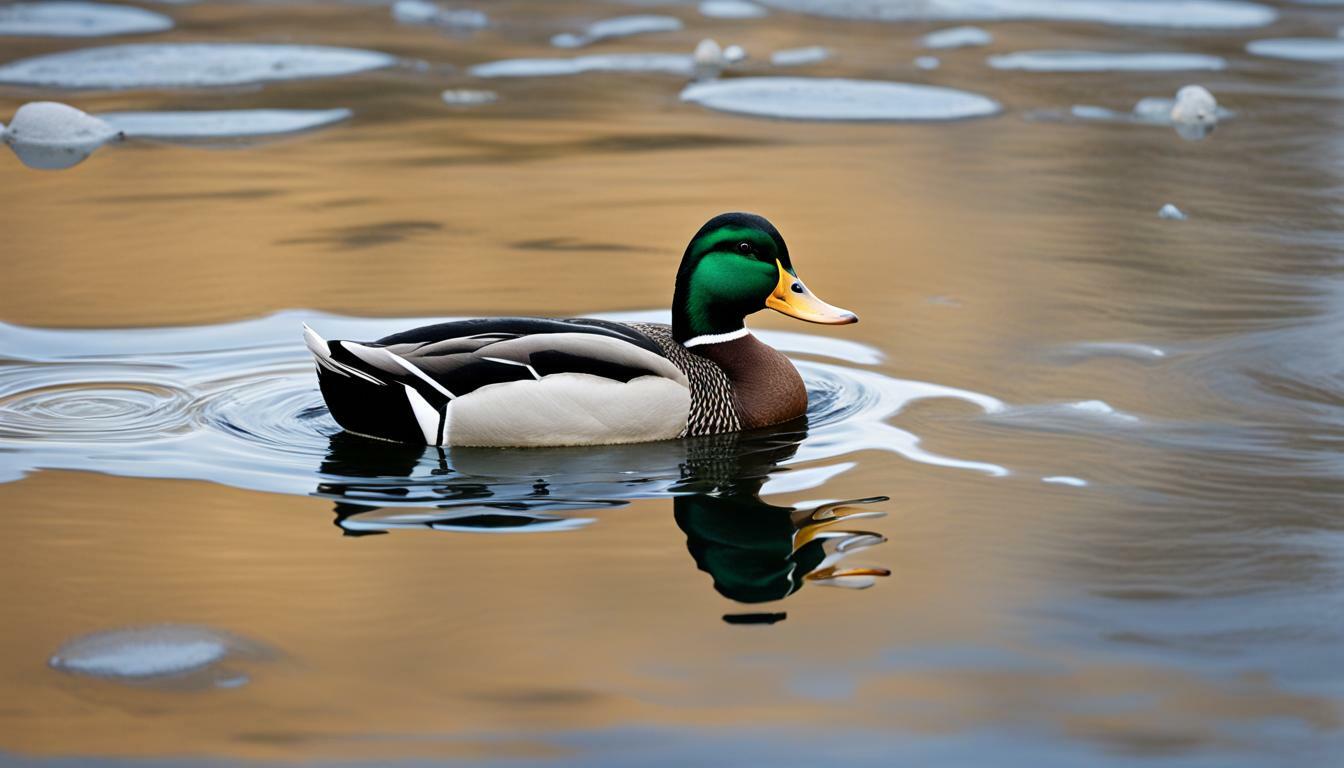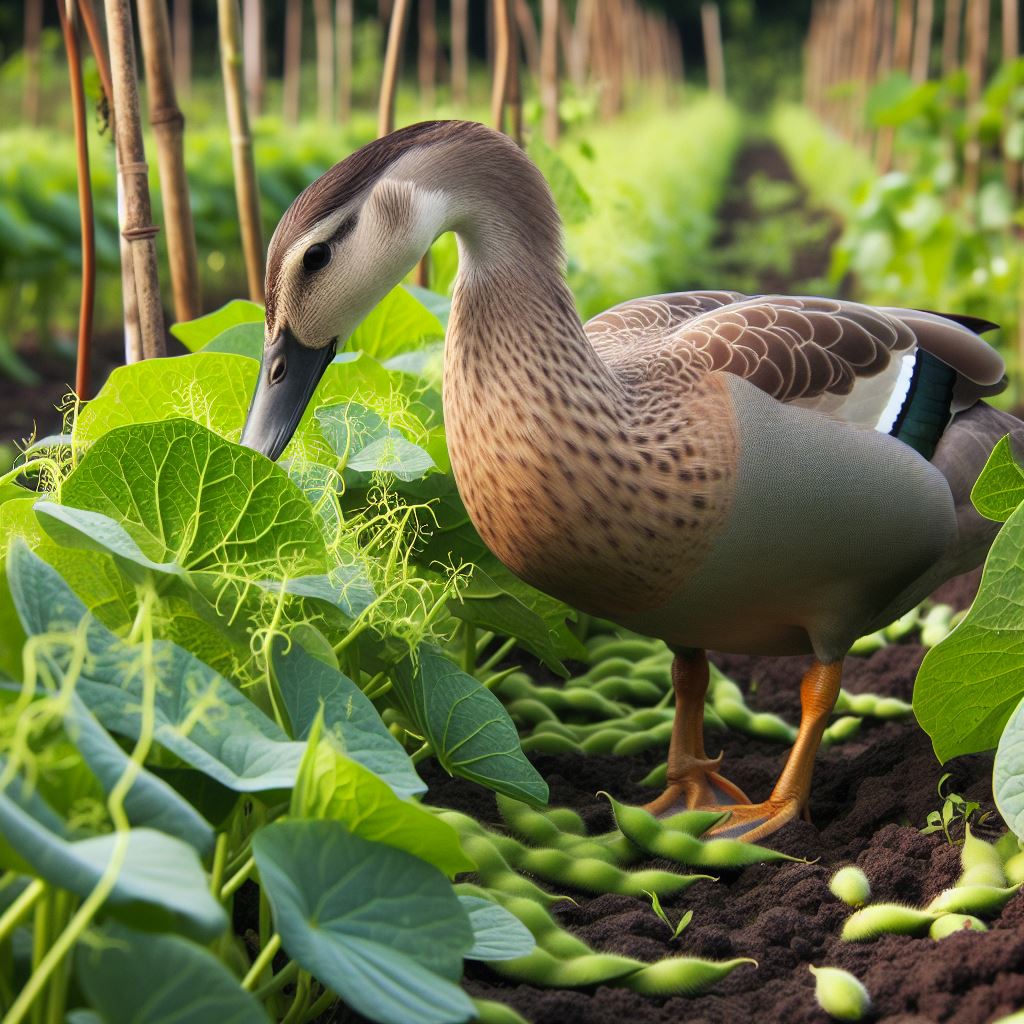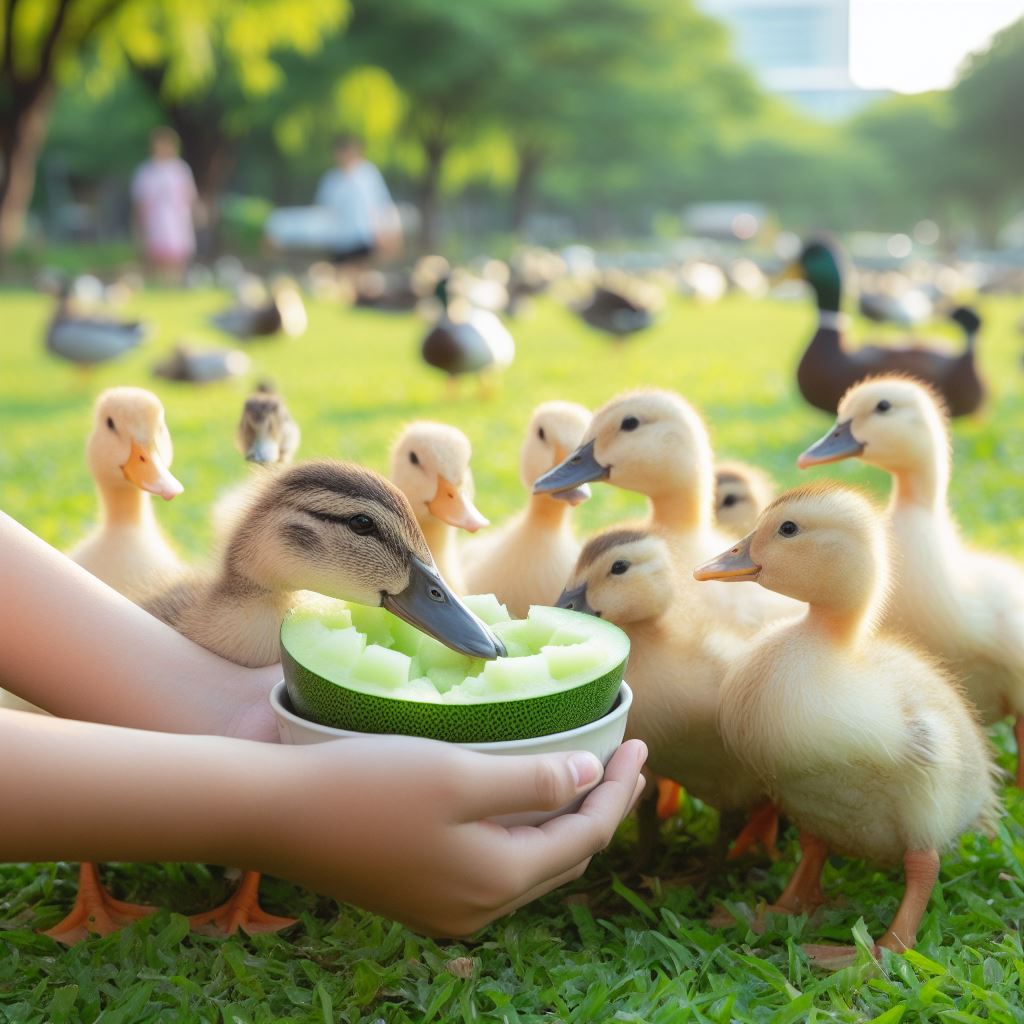Can Ducks Eat Guava? Experts Reveal the Answer

Daftar isi:
- What is Guava and Why is it Healthy?
- Are Guavas Safe For Ducks to Eat?
- The Health Benefits of Guava for Ducks
- Are There Any Risks or Downsides?
- How Much Guava Should You Feed Ducks?
- 5 Tips for Serving Guava Safely to Ducks
- What Duck Breeds Can Eat Guava?
- What Other Fruits Can Ducks Eat?
- In Summary: The Best Practices for Feeding Guava to Ducks
Guava is a sweet, tropical fruit that is relished by humans for its flavor, aroma, and nutritional value. But what about our feathered friends? Can ducks eat guava too?
As it turns out, ducks can safely and happily eat guava in moderation as part of a balanced diet. Guavas contain beneficial vitamins, minerals, fiber and more that ducks can benefit from. However, there are some risks to be aware of, and guava should only comprise a small part of a duck’s overall food intake.
Below, we’ll cover everything you need to know about feeding guava to ducks, including:
- An overview of guava and its nutritional benefits
- Are guavas safe for ducks to eat?
- Health benefits of guavas for ducks
- Potential risks and downsides
- How much guava to feed ducks
- Tips for serving guavas to ducks safely
- The best duck breeds for eating guava
- Other fruits and veggies ducks can eat
 What is Guava and Why is it Healthy?
What is Guava and Why is it Healthy?
Guava (Psidium guajava) is a sweet, soft fruit with green or yellow skin and pink/white flesh. Guava is native to Central and South America and is grown in tropical and subtropical regions around the world.
These popular fruits are packed with goodness:
- Vitamin C: Guavas contain over 3 times the vitamin C of oranges. This powerful antioxidant promotes immune health and wound healing.
- Vitamin A: Guavas provide vitamin A in the form of beta-carotene. This vitamin keeps eyes, skin and more in good shape.
- Lycored: Guava contains a potent antioxidant compound called lycored that offers additional health benefits.
- Fiber: A guava provides around 5 grams of dietary fiber that aids healthy digestion.
- Potassium: Guavas are high in potassium, an essential mineral for nerves, muscles and metabolism.
- Antioxidants: Guavas provide flavonoids, carotenoids and tannins that act as antioxidants in the body.
With this outstanding nutrition profile, guavas are considered one of the world’s “superfruits.”
So how do ducks benefit from all that guava goodness?
Are Guavas Safe For Ducks to Eat?
Luckily for ducks, guavas are considered non-toxic to ducks and safe for them to eat in moderation.
A small portion of fresh guava flesh, without the peel and seeds, makes a tasty, nutritious snack or supplemental treat for ducks.
Guavas provide ducks with many of the same benefits they offer humans – antioxidants to reduce cell damage, vitamin C for immune function, fiber for digestion, and more. These can support duck health and wellbeing in key ways.
However, guava does pose some risks to ducks if fed incorrectly or in excess. We’ll cover those next.
The Health Benefits of Guava for Ducks
When fed properly as part of a balanced diet, guavas offer fantastic nutrition for ducks, including:
1. Vitamin C for Immunity
Ducks need vitamin C for cardiovascular health, connective tissue strength, wound repair and immune function.
Guavas contain ample vitamin C to help ducks fight infection and disease. This makes them a smart choice, especially leading into high-stress seasons like winter or molting.
2. Antioxidants Against Cell Damage
Guava’s rich antioxidants – like lycopene and vitamin C – help defend ducks against oxidative cell damage from free radicals.
This protects the eyes, brain, organs and tissues to support overall wellness long-term.
3. Fiber for Digestive Health
A diet too low in fiber can lead to diarrhea or constipation in ducks. Guava’s ample fiber helps promote healthy digestion and bowel movements.
This helps prevent more serious issues like gut impaction or blockage.
4. Other Vitamins and Minerals
Guavas also provide smaller amounts of vitamin A, potassium, magnesium and more. These support vision, circulation, bone strength and enzyme function in ducks.
So by enjoying the occasional guava, ducks gain a health boost across the board!
Are There Any Risks or Downsides?
While guava can be safely enjoyed by ducks, overdoing it does pose some risks, such as:
Choking Hazard
Whole guavas present a major choking risk to ducks – especially smaller breeds like call ducks. Ducks may try to swallow the fruit whole and end up choking.
Always dice guava into small pieces before feeding to ducks. Supervise them while eating to be safe.
Excess Calories
Guavas are relatively high in natural sugar compared to other fruits. Too much can easily lead to weight gain or obesity.
Limit guava servings to no more than 10% of a duck’s daily calories to prevent excess weight gain. Track overall food amounts when including guava.
Crop Impaction
A duck’s crop is a pouch-like organ that stores food before sending it to the stomach for digestion. Guava bits with peel, seeds or strings pose a risk for crop impaction (blockage) if not sufficiently chewed.
Always remove seeds, peel and fibers first to reduce this hazard. Also, provides insoluble grit to promote digestion.
Intestinal Blockage
As with crop impaction, undigested seeds, peels or fiber can also obstruct a duck’s intestines if swallowed whole.
Monitor ducks after feeding guava and call a vet promptly for signs of distress like lethargy, appetite loss or stretching the neck.
Allergies
It’s possible for a duck to have a guava allergy, just like some humans do. Discontinue feeding if any swelling, skin irritation or breathing issues arise after eating guava.
By following proper precautions, guava allergies are uncommon. But it’s wise to introduce new foods gradually and watch closely for reactions.
How Much Guava Should You Feed Ducks?
When adding guava or any human food as a supplemental treat, moderation is key. As a general rule:
- No more than 10% of a duck’s daily food intake should come from fruit or other treats.
- For an average 5 lb duck eating 6 ounces of food daily, guava should be limited to about 1⁄2 ounce or 1-2 small slices.
- Adjust serving sizes relative to the duck’s weight and overall diet. Give less to smaller ducks and more to rapidly growing ducklings or breeding females.
- Do not replace duck feed or grit with guava. Provide a species-appropriate duck feed, plus insoluble grit at all times to safely facilitate digestion.
- Remove all peel, seeds, stems and fiber bits first to reduce the risk of blockages before serving.
- Offer guava 1-2 times per week at most as a supplemental snack alongside their species-appropriate feed.
Monitoring overall food amounts and the duck’s body condition will help determine proper guava portion sizes.
5 Tips for Serving Guava Safely to Ducks
Follow these top tips for letting ducks enjoy guava without issue:
1. Wash Thoroughly
Remove any debris and rinse well. This prevents contamination or illness.
2. Dice Small
Chop guava flesh into 1⁄4 to 1⁄2 inch cubes. This makes it easier to digest and less likely to obstruct.
3. Remove All Seeds
Seeds pose significant choking hazards and can block the crop or intestines if swallowed. Inspect well and remove them all!
4. Take Out Peel and Strings
The fibrous peel and core strings also don’t digest well. Removing them reduces risks tremendously.
5. Supervise Mealtimes
Stay present while feeding guava to observe for choking or adverse reactions requiring prompt assistance. Don’t allow ducks to wander off while eating.
By following these easy precautions for preparing and serving guava safely, ducks can gain great nutrition without issues!
What Duck Breeds Can Eat Guava?
All domestic duck breeds – from large Pekins to tiny calls – can safely eat moderate amounts of properly prepared guava.
Some specific duck varieties that tend to especially enjoy fruit treats include:
- Mallards: The wild relatives of most domestic ducks eat a variety of fruits, veggies, insects and more. Mallards relish sweet fruits and eagerly accept treats.
- Call Ducks: Small and social calls bond closely with their owners in exchange for snacks! Carefully diced, seedless guava hits the spot.
- Muscovy Ducks: Originally wild forest-dwellers, muscovies will try nearly any novel food. Their omnivorous diets happily include fruits.
- Wood Ducks: Another wild species kept by some as pets, brightly-hued wood ducks bring their adventurous foraging nature to the backyard flock!
Even day-old ducklings can try tiny pieces of soft, ripe guava as an introduction to natural treats.
Overall, most ducks given the opportunity are quite eager to partake in sweet fruits like guava! Proper preparation is key for safety, though.
What Other Fruits Can Ducks Eat?
Guava is just one of many delicious fruits ducks can safely enjoy if fed properly. Some other excellent options include:
Melons – Watermelon, cantaloupe, honeydew
Berries – Strawberries, blackberries, raspberries
Citrus Fruits – Oranges, tangerines, clementines
Tropical Fruits – Pineapple, mangoes, papaya
Common Fruits – Apples, pears, bananas, grapes
Fruit should only comprise a small portion of a duck’s diet, along with species-appropriate duck feed and grit.
Focus on chopping produce into bite-sized pieces and removing all seeds, pits, and tough rinds before feeding. Supervise closely and offer fruits sparingly to promote health without excess calories.
In Summary: The Best Practices for Feeding Guava to Ducks
Guava is a nutritious tropical fruit ducks can safely enjoy. Follow these key practices for the healthiest results:
- Only feed ripe, sweet guava flesh after removing all peel, seeds and fibers
- Dice into 1⁄4 to 1⁄2 inch cubes or slices for safe swallowing
- Total fruit should only equal 10% or less of daily intake
- Adjust portion sizes based on duck breed size and weight
- Provide a nutritious base feed and insoluble grit at all times
- Monitor ducks closely while eating to observe for reactions
- Offer fruit treats just 1-2 times weekly in warm months
When feeding proper quantities of properly prepared guava as an occasional supplement, ducks can gain great benefits without risks! Both pet ducks and wild waterfowl will relish this sweet snack straight from the grove.
Welcome. I’m Adreena Shanum, the proud owner of this website, and I am incredibly passionate about animals, especially poultry. I founded adreenapets.com as a labor of love, stemming from my desire to share my knowledge and experiences with poultry enthusiasts worldwide.




